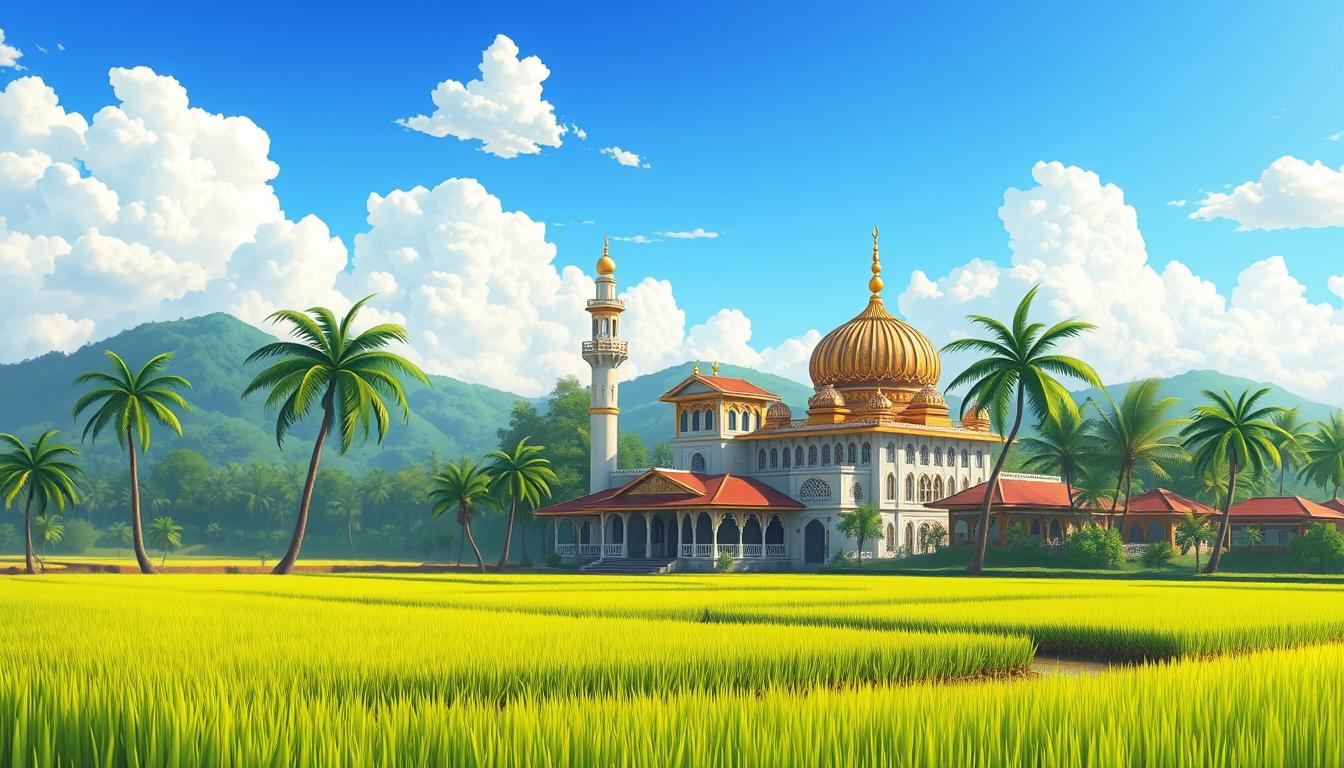Islam in Thailand
Surprising as it may seem, Islam is the faith of nearly 12% of Thailand’s 62.5 million inhabitants, making the Thai Muslim community the largest religious minority in the country. With an estimated population of 7.5 million, these adherents of the Islamic faith have woven themselves into the rich tapestry of Thai culture, contributing to the nation’s diversity and cultural heritage.
Key Takeaways
- Islam is a minority faith in Thailand, with around 12% of the population identifying as Muslim.
- Thai Muslims make up the largest religious minority in the country, with a population of around 7.5 million.
- Most Thai Muslims are Sunni, but the population includes diverse ethnic groups that have migrated from various countries.
- The southern provinces of Satun, Yala, Pattani, and Narathiwat have the highest concentration of Thai Muslims, with over 24% of the population in these areas identifying as Muslim.
- Thai Malays, who make up about two-thirds of the Muslim population, predominantly reside in the southern provinces.
Demographics and Geographic Distribution of Thai Muslims
Thailand’s religious landscape is diverse, with the majority of the population adhering to Theravada Buddhism. However, the country is also home to a significant Muslim minority, making up approximately 5.4% of the total population, according to the Department of Religious Affairs.
The geographic distribution of Thai Muslims is largely concentrated in the southern regions of the country. Around 80% of Thai Muslims reside in the three southernmost border provinces of Satun, Yala, and Pattani, where they constitute the majority of the local population. These Malay-majority southern provinces are considered the heartland of Islam in Thailand.
Muslim Communities in Central and Urban Areas
While the southern provinces are the stronghold of the Muslim population, there are also significant Muslim communities in central and urban areas of Thailand. The Thai Ministry of Foreign Affairs’ research indicates that only 18% of Thai Muslims live in the southern border provinces, with notable Muslim minorities found in other southern provinces and in Bangkok districts such as Nong Chok, Min Buri, and Bang Rak.
The Muslim population in Thailand is diverse, with ethnic Malays making up the majority in the southern regions, as well as descendants of immigrants from South Asia, China, Cambodia, Indonesia, and ethnic Thai individuals. Regardless of their geographic distribution, the vast majority of Thai Muslims, over 99%, practice Sunni Islam.
“Islam is the dominant religion in the three southernmost provinces near the Malaysian border, with a higher concentration of Muslims in Narathiwat, Yala, and Pattani.”
Historical Origins and Development of Islam in Thailand
The history of Islam in Thailand dates back centuries, with Muslim merchant communities residing in the region as early as the 9th century. These early Muslim traders and settlers played a crucial role in the origins and development of Islam within the Thai kingdom, then known as Siam.
During the early modern period, Muslims from the Coromandel Coast in India served as eunuchs in the Thai palace and court. Siam, known for its religious tolerance, welcomed these Muslim communities who worked for the Siamese Royal Governments throughout the eras. This culture of acceptance and integration contributed to the rich diversity of Islam in Thailand.
Early Muslim Trade and Settlement
Islam’s presence in Thailand can be traced back to the 7th century, when Muslim merchants expanded their trade networks along the maritime Silk Roads, reaching important coastal cities in the Indian Subcontinent, China, and Southeast Asia, including the Malay Peninsula that was part of the Siamese kingdom.
Archaeological evidence suggests the adoption of Islam by Sumatran kings as early as the 12th century, and the religion’s further spread through trade and interactions with local populations in the region. By the 13th century, the mass conversions to Islam began, with political conversions by rulers and the integration of Islamic provinces into the Thai kingdom during the reign of King Ramkhamhaeng.
The history of Islam in southern Thailand, particularly the Patani region, involves the conversion of high-status individuals and the gradual acceptance of the religion through intermarriage and cultural exchange. This process contributed to the diverse and vibrant Muslim communities that exist in Thailand today.
“The spread of Islam in Thailand was a gradual and multifaceted process, shaped by centuries of trade, cultural exchange, and religious tolerance.”
Ethnic and Cultural Diversity of Thai Muslims
Thailand’s Muslim population is ethnically diverse, with groups that have migrated from China, Pakistan, Cambodia, Bangladesh, Malaysia, and Indonesia, as well as including ethnic Thais. About two-thirds of Thai Muslims are Thai Malays, who speak Kelantan-Pattani Malay and live primarily in the southern border provinces.
Ethnic Thai Muslims, who are either hereditary Muslims, Muslims by intermarriage, or recent converts, live mainly in the central and southern provinces. In northern Thailand and some urban areas, there are also pockets of Thai Muslims of Hui (ethnic Chinese Muslim) origin, known as the Chin Haw.
“The ethnic diversity of Thai Muslims, including Thai Malays, ethnic Thai Muslims, and Chinese Muslims, reflects the rich cultural tapestry of the country.”
Thai Malays
The Thai Malay Muslims, who make up about two-thirds of the country’s Muslim population, are concentrated in the southern border provinces. They speak a distinctive Kelantan-Pattani Malay dialect and maintain strong cultural ties with their ethnic kin in neighboring Malaysia.
Ethnic Thai Muslims
Ethnic Thai Muslims, who make up the remaining one-third of the Muslim population, are either hereditary Muslims, Muslims by intermarriage, or recent converts. They are found throughout the central and southern regions of Thailand.
Chinese Muslims (Chin Haw)
In northern Thailand and some urban areas, there are also pockets of Thai Muslims of Hui (ethnic Chinese Muslim) origin, known as the Chin Haw. These Chinese Muslims maintain their distinct cultural and linguistic traditions while integrating into the broader Thai Muslim community.
Islam in Thailand: Traditions and Practices
Thai Muslims generally follow customs and traditions associated with traditional Islam, often reflecting Sufi beliefs and practices. The Islamic faith in Thailand is influenced by Sufism, as in other Asian countries like Bangladesh, India, Pakistan, Indonesia, and Malaysia. The Ministry of Culture’s Islamic Department recognizes and promotes Thai Muslim contributions to Thai life as citizens, educators, and social workers.
Islam is the second-largest religion in Thailand, with Muslims making up around 5.45% of the population. Thai Muslims consider the country as their homeland and feel equally committed to their nation as Thai Buddhists. They do not see a contradiction between their religion and loyalty to their nation, as Islam has coexisted harmoniously with Buddhism in Thailand for centuries.
The Thai government officially recognizes and patronizes Islam as the kingdom’s second-largest religion. Thai society has a high level of religious tolerance, promoting harmonious co-existence between followers of major religions in the kingdom. Thai Muslims do not see a contradiction between their love for Islam and their loyalty to the nation, indicating that Islam has integrated into the modern Thai state.
“The translation of the Holy Quran from Arabic into Thai was completed in 1964 by Tuan Suwannasat, the then Chula Rajamontri of Thailand, commissioned by King Bhumibol Adulyadej The Great.”
The Thai Quran with the royal cypher of King Bhumibol Adulyadej The Great on its green cover was published by the Religious Affairs Department in 1968 and distributed to mosques nationwide. His Majesty the King continues to preside over the annual Maulid Nabi Celebration to promote a deeper connection to faith among Thai Muslims.
Islamic Institutions and Governance in Thailand
Thailand is home to a vibrant and diverse Muslim community, making up approximately 12% of the country’s total population. The governance of Islamic affairs in Thailand is structured through a network of Islamic institutions that work closely with the Thai government.
Central Islamic Committee and Provincial Committees
At the national level, the Central Islamic Committee of Thailand, led by the Chularajmontri (Shiekhul Islam or Grand Mufti), serves as a state advisor on Islamic affairs. This committee plays a crucial role in shaping the governance of Islamic institutions in the country.
Additionally, each province with a sizable Muslim population has its own Provincial Islamic Committee. These committees advise on Islamic affairs at the provincial level and have the authority to appoint the Committees of the Mosques, further decentralizing the governance of Islamic institutions in Thailand.
“The Central Islamic Committee of Thailand, led by the Chularajmontri (Shiekhul Islam or Grand Mufti), acts as a state advisor on Islamic affairs.”
The governance of Islamic affairs in Thailand is an intricate and multi-layered process, with the Central Islamic Committee and Provincial Committees playing a pivotal role in shaping the direction of Islamic institutions and practices within the country.
Education and Islamic Studies in Thailand
Thailand’s educational system accommodates Islamic education and institutions. Young Thai Muslims can enroll in pre-school development centers (rawdah) and centers for religious and ethics training (tadika) run by local mosques. At the primary and secondary school levels, they can choose between regular schools or private Islamic schools (Pondok or Ponoh).
At the university level, the Thai government has established the College of Islamic Studies in Pattani Province, and plans to open another Islamic university in Narathiwat Province in collaboration with Al Azhar University of Egypt. These institutions provide Islamic education in Thailand and cater to the educational needs of the country’s Muslim population.
Islamic Schools and Universities
The Islamic schools and universities in Thailand play a crucial role in preserving and promoting Islamic knowledge and traditions. These educational institutions offer a range of programs, from pre-school to higher education, focusing on the integration of religious and secular subjects.
“Islam, Education, and Reform in Southern Thailand” by Joseph Liow is a groundbreaking publication that provides rich empirical insights into the state of Islamic education in Thailand. The book critically examines the intersections between religion, politics, and modernity in the region.”
Researchers suggest that the implementation of integrated Islamic education in southern Thailand and northern Malaysia faces challenges, such as longer school hours, lack of wider student involvement, and difficulties in curriculum integration. However, cross-border cooperation and the development of comprehensive policies can address these issues and strengthen the quality of Islamic education in the region.
Overall, the Thai government’s commitment to Islamic education and the establishment of specialized institutions demonstrate its recognition of the importance of religious education and the diverse educational needs of the country’s Muslim population.
Islam in Thailand and the Monarchy
The Thai monarchy has a long-standing tradition of supporting and extending royal patronage to Thai Muslims, as well as people of other religious faiths. The Thai King, as the Head of State, appoints the Chularajmontri (Shiekhul Islam or Grand Mufti) and often participates in or appoints a royal representative to the annual ceremony marking the anniversary of the birth of the Prophet Muhammad (Mawlid).
The role of the Thai monarchy in supporting Islam and the Thai king’s patronage of Islamic affairs have played a significant role in fostering a harmonious relationship between the Muslim community and the state. Throughout Thailand’s history, successive monarchs have actively engaged with the Muslim population, recognizing the importance of Islam in the country’s cultural and social fabric.
“The Thai King, as the Head of State, appoints the Chularajmontri (Shiekhul Islam or Grand Mufti) and often participates in or appoints a royal representative to the annual ceremony marking the anniversary of the birth of the Prophet Muhammad (Mawlid).”
For instance, King Chulalongkorn, also known as Rama V, applied Shariah law in family and inheritance cases among Muslims in southern Thailand, demonstrating the Thai monarchy’s commitment to accommodating the religious needs of its diverse population. Furthermore, the official translation of the Holy Quran was initiated in 1968 by King Bhumibol Adulyadej The Great, further showcasing the Thai monarch’s support for the Muslim community.
The upcoming 6th Cycle Birthday Anniversary of King Maha Vajiralongkorn Phra Vajiraklaochaoyuhua on 28 July is a significant event for Thailand, as the Thai monarch’s continued patronage of Islamic affairs and support for the Muslim community is expected to be highlighted and celebrated.
Role of Government in Promoting Islamic Affairs
The Thai government has played a pivotal role in supporting Islamic affairs and the status of Thai Muslims. In 1997, the Act on the Administration of Islamic Organizations was introduced, leading to the formation of the Central Islamic Committee and provincial committees to advise on Islamic matters.
Islamic Law and Jurisprudence
The Thai government provides for the application of Islamic law concerning heritage and family affairs in the southern border provinces, where the majority of the Muslim population resides. This recognition of Islamic jurisprudence reflects the government’s commitment to accommodating the religious and cultural needs of its diverse citizenry.
Islamic Banking
To enable Muslims to conduct their financial affairs in accordance with Islamic principles, the Thai government has established the Islamic Bank of Thailand. This institution offers Sharia-compliant banking services, catering to the specific requirements of the Muslim community and promoting financial inclusion.
The Thai government’s proactive approach to supporting Islamic affairs, from the legal system to the financial sector, demonstrates its recognition of the importance of accommodating the needs of its Muslim population. This multifaceted engagement helps to foster religious harmony and social cohesion within the country’s diverse, multi-faith landscape.
“The Thai government’s commitment to promoting Islamic affairs reflects its understanding of the diverse religious and cultural needs of its citizens. This inclusive approach strengthens the bonds of unity and mutual respect within the nation.”
Islam in Thailand
Islam is a well-integrated and respected religious minority in Thailand, with Thai Muslims enjoying the same legal and political status as Thais of other religious beliefs. Thai Muslims have made significant contributions in various fields, including holding high-ranking positions in the government and parliament.
While there have been challenges, such as the ongoing conflict in the southern border provinces, the Thai government and monarchy have consistently supported the rights and freedom of Thai Muslims to practice their faith and preserve their cultural identity. The overall status of Islam in Thailand is one of integration, with the integration of Thai Muslims being a key aspect of the country’s diverse religious landscape.
“Thailand’s Indigenous Thai-Muslim community represents the largest religious minority in the country.”
The majority of Thailand’s Muslims are concentrated in the southern provinces, specifically in Pattani, Yala, Narathiwat, Surat Thani, Nakhon Si Thammarat, and Songkhla. These regions have a long history of Islamic influence and have played a significant role in shaping the overall status of Islam in Thailand.
Despite the challenges, Thai Muslims have continued to contribute to the country’s cultural and social fabric. From the historic Bulao Malayu Mosque on Ko Pha-Ngan to the vibrant halal street food scene in Nakhon Si Thammarat, Thai Muslims have left an indelible mark on Thailand’s diverse heritage.
As Thailand continues to navigate the complexities of its religious landscape, the integration of Thai Muslims remains a crucial aspect of the nation’s efforts to promote unity, diversity, and mutual understanding among all its citizens.
Conclusion
Islam has a long and diverse history in Thailand, with Thai Muslims representing the largest religious minority in the country. Thai Muslims are integrated into the larger society, enjoying the same rights and opportunities as other Thai citizens. The Thai government and monarchy have played a crucial role in supporting Islamic institutions, education, and the preservation of Muslim traditions and practices.
While there are ongoing challenges, the overall status of Islam in Thailand reflects the nation’s commitment to religious tolerance and the integration of its diverse population. The conclusion of this article summarizes the key points covered, highlighting the evolution and influence of Islam in Thailand’s rich cultural tapestry.
Throughout the analysis, the article has provided a comprehensive understanding of the demographics, historical origins, ethnic diversity, and institutional frameworks that shape the role of Islam in Thai society. The findings underscore the complex and nuanced interplay between Islam, Thailand’s Buddhist majority, and the country’s broader sociopolitical landscape.
Source Links
- Islam in Thailand
- Muslim in Thailand – สถานเอกอัครราชทูต ณ กรุงริยาด
- Thailand – United States Department of State
- Thai Islam in Thailand
- Thailand – United States Department of State
- Section I: History if Islam in Thailand
- Did you know?: The Spread of Islam in Southeast Asia through the Trade Routes
- Muslim in Thailand – สถานเอกอัครราชทูต ณ กรุงริยาด
- MUSLIMS AND ISLAM IN THAILAND AND THE THAI PAK TAI IN SOUTHERN THAILAND
- The Muslims of Thailand – IRASEC
- Muslims in Thailand under Royal Benevolence – สถานเอกอัครราชทูต ณ กรุงบูดาเปสต์
- Muslim in Thailand – สถานเอกอัครราชทูต ณ กรุงริยาด
- The Islamist Insurgency in Thailand
- Thailand, Muslim separatists agree on new plan to end violence
- Islam, Education and Reform in Southern Thailand: Tradition and Transformation | ISEAS Publishing
- วารสารสิทธิ์ vol 2-2
- Thailand’s commitment to religious diversity: Muslims in Thailand under royal benevolence
- The Institution of the Monarchy and Islam
- Organization of the Islamic Cooperation (OIC) / Republic of Türkiye Ministry of Foreign Affairs
- 7. Religion and politics
- A personal journey around Thailand’s lesser-known Muslim south
- Religion in Thailand
- Thailand – United States Department of State
- Microsoft Word – ASSRJ-Vol5-Issue11-Nov 2018 USMAN.docx
- Southern Thailand: From Conflict to Negotiations?







